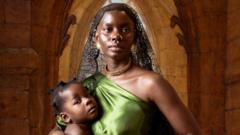Dola Posh wears many hats: she is a photographer, a Nigerian woman, a mother, and a Briton, but after giving birth, she struggled to recognize herself. Just six days postpartum, Dola found herself in a hospital bed during a Covid lockdown, wrestling with the dramatic changes in her life and the fear of never being able to pursue her passion for photography again. Calls from concerned relatives only heightened her pressure, compounded by the distance from her family back in Lagos, Nigeria.
In this emotionally charged environment, Dola described her mental state as spiraling into a “dark place.” “I thought: ‘I’m me; the baby’s out, I’m still me.’ But no, I wasn’t me anymore.” This disorientation often marks the onset of postnatal depression, a condition that significantly impacts black women. At the time, Dola was unaware that she was experiencing this condition.
After leaving the hospital, Dola was immediately inundated with unsolicited advice on child-rearing, which further overshadowed her confidence. “There was too much talk, too much control around how I should raise the child,” she recalled. This excess of input made her feel inadequate, preventing her from embracing her role as a new mother.
Dola reflected on the chaos of her life in 2020 with a blend of melancholy and resolve. Despite moments of overwhelming sadness, including thoughts of ending her life, she sought help and reached out to her health visitor. Sharing her struggles with a therapist provided a turning point, and she was encouraged to rediscover her passion for photography as a healing tool.
Previously renowned for her work in Lagos’s fashion and celebrity photography scenes, Dola turned the camera on herself and her daughter Monioluwa. Using a remote app, she began creating powerful self-portraits that captured her emotional journey, inadvertently echoing the classical imagery of mother and child in art history.
Dola's artistic expression became both a means of therapy and a way to explore her multifaceted identity. Raised in a religious family with deep cultural roots, she found that wearing a veil during her shoots reconnected her with her heritage and provided a sense of authenticity.
As Dola shared her story, she found a voice that broke the cycle of shame surrounding her experience with postnatal depression. She now aims to shed light on the struggles many black mothers face, advocating for their visibility and shared experiences. “I want a world where black mothers don’t have to carry so much burden,” she stated emphatically.
Through her imagery and the conversations it sparks, Dola is determined to reshape the narrative around motherhood and mental health. Earlier this year, she was awarded a photography grant from Leica to support her ongoing project, bringing attention to the often-ignored complexities of motherhood and mental well-being.
Today, she encourages women to speak out about their experiences: “It’s new for a woman to stand there and say: ‘I almost ended my life, I’m not ashamed of it.’” Dola's powerful message resonates deeply, advocating for a society where black mothers can find strength in solidarity and representation in the media.




















